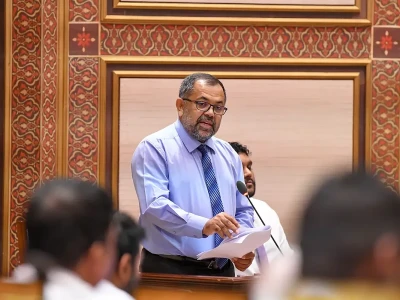
Maldives to hike dollar taxes, not public-related fees
The hike includes green tax and duty on unhealthy products; it will not include GST and T-GST.
Top Stories
-
Aasandha costs projected to reach MVR 4bn next year, audit finds
-
Land dredging begins for Dhidhdhoo airport development
-
Zameer denies plans to sell Thilafushi port amid DP World claims
-
Better to hand over Hanimaadhoo airport to India company: Nasheed
-
Commodity prices flat in Nov as inflation records annual rise
Economic and fiscal reform measures will be aimed at increasing taxes on dollar revenue without increasing any taxes levied directly on the general public, finance minister Dr Mohamed Shafeeq said Wednesday.
Speaking to the finance committee of the parliament today, Shafeeq said there are serious obstacles in paying foreign debt and bills to the public.
The next concern on top of those obstacles is the increase in external debt in 2025 and 2026, he said.
There is no way to move forward without taking financial reform measures to improve the sustainability of the debt, Shafeeq said. To do that, government needs to increase revenue while reducing costs, he said.
-
He assured that measures to increase revenue and reduce expenditure would be taken to reduce the suffering of the people
-
The highest priority is not to increase the taxes that the common people have to pay
-
The decision was taken because taxes were increased recently during the previous government
"In fact, the government's intention is to ensure that taxes and fees do not burden the people. They include GST, T-GST, BPT and withholding tax. The government has no intention of increasing such taxes," he said.
Noting that tax rates have been increased since January 2023, Shafeeq said the government's intention is to expand the tax base and increase the revenue. He said the government is planning to increase taxes and fees that generate dollar revenue in order to prepare to pay off its huge foreign debt in 2026.
“The debts are dollar-denominated debts. So, every Maldivian citizen would want us to work towards building a sovereign development fund as a fiscal buffer,” Shafeeq said.
Hike in green tax, duty on unhealthy products
The minister said the airport development fee and departure tax will be increased. The airport development fee is deposited in the Sovereign Development Fund (SDF). However, the minister said he had no intention of increasing the airport fees on Maldivians.
In addition, the next expansion is considered:
-
Green tax; The tax is planned to be doubled
-
Changes to the tax base and further increases in duties on tobacco and energy drinks
The government also spends a lot on fuel, Shafeeq said, adding that an average of MVR 100 million is spent on paying fuel bills per week.
"The fuel bill is a bill that has to be made in dollars using reserves. There is a lot of foreign currency to be paid for medical supplies. So it is very important that we find ways to get foreign currency now," he said.
Shafeeq said taxes and fees would be increased in consultation with the relevant authorities.
The government's revenue policy or medium-term revenue strategy report for the next four years, approved by the cabinet and released by the finance ministry in June, includes reviewing the current amounts of GST and import duties on goods and services purchased by the public.
According to the report, the measures to be taken before the end of this year to increase revenue are:
-
Increase the fees and taxes currently levied on airport passengers; It is learned that the airport development fee is planned to be doubled
-
The next step is to review some of the duty concessions currently granted under the Export Import Act; Under the policy, duty concessions on goods imported to regional ports have been abolished
Aasandha cut won't affect public
Speaking to the committee on Wednesday, deputy finance minister Ahmed Saeed Mustafa said the government would work to increase revenue in such a way that the impact on the lives of the people would be minimised.
The cost-cutting measures will also reduce the cost of the Aasandha national health insurance scheme and ensure that the most needy person gets the scheme and stops having to pay for medical treatment, he said.
“We are working in accordance with the president's instructions to take measures to reduce expenditure and increase revenue in a manner that will not affect the lives of the people,” Saeed said.
In addition, many cost-cutting measures will be done to reduce costs, he said, adding that many things have not been done for many years. Bulk procurement of medical supplies and medicines reduces costs and facilitates quality items, he said.
“We are moving towards steps that will bring about positive changes overall,” Saeed said.
Related
Related

Budget records MVR 1.3B surplus; debt repayments at MVR 5.1B

Maldives begins talks to refinance over $1 billion in debt

Confident of mitigating risks amid Moody's rating cut: Maldives

